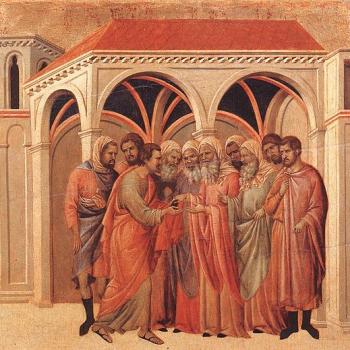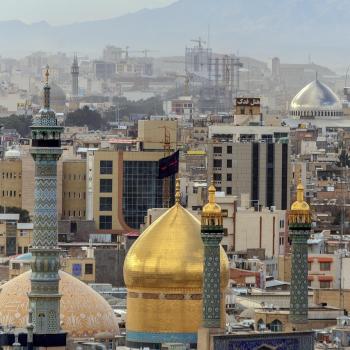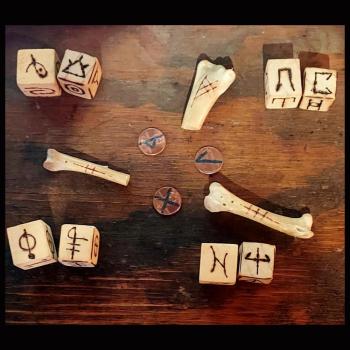Editors' Note: This article is part of the Patheos Public Square on Remembering the Dead: Ancestors, Rituals, Relics. Read other perspectives here.
I like to think of the old weather-worn globe as the mother of us all. . . .and that humanity, with our arts, and bibles, and religions, and literatures, and philosophies—heros, saints, martyrs, sages, poets, prophets—all lay folded there in the fiery mist out of which the planet came. ~ John Burroughs, "The Divine Soil," Leaf and Tendril (1908)
A person who has no faith still faces loss and death. We grieve. And we can celebrate a person's life and living. We simply have no time for imagining what's "over there across the river." Life as we know it is just too short. As Thoreau apparently mumbled on his deathbed, "One world at a time." This doesn't sanitize death or avoid it—it radically faces the reality of mortality and our evolving, rather fragile existence.
In recent times I've lost some friends. You may find it interesting that each of these was a person of faith. Two rabbi friends passed away and three ministers I know also died. One was my old seminary roommate (and fellow heretic) Tom. Howard was my professor of Reformed Church History and Ben was my professor of Theology. They each had a strong impact on my direction in ministry, and each (they might be surprised to hear) gave me hints on a way out of faith.
That's another story. Here I would simply say that all of these fellow clergy, teachers, and friends live on in my life. They are each a part of me, as are my long-departed—but still quite present—parents. Are they all in Heaven? Are they all "with God"? I don't think so. I'm not at all sure what that even means anymore. But they are most certainly absorbed into this other human being who still lives on. And I honor their lives each day in my own.
"Absorbed" is a word I like to hold in my hand and squeeze from time to time. Poets and pantheists enjoy it. I like it because it invites me to wonder about life or death as journeys that really don't "go" anywhere! If we are "home" here, on this earth, in this universe, then we saunter about our home for a short number of things we call years and then "go deeper," get absorbed back into the home we came from and never left. Quite a circle. This no doubt displeases the folks who believe in beaming to other worlds. But I find it satisfying and indeed quite wonderful. By absorption I'm not referring to a "soul" slipping back into a big ocean of soul-ness. I'm remembering the burial sites in Scotland where trees were growing straight through the graves. I'm graphically thinking of "coming apart at the seams"—being dismantled, as it were, piece by piece, cell by cell, atom by atom and dispersed as far as that's materially possible. A journey indeed! Amazing really. Sure beats a golden city with endless church services doesn't it?
Death and the fear of it, the mystery of it, created a "need to know," some way for humans to feel comforted and assured that to be human is not just about adding water to humus. Our humility led us to imagine another world, a better world, beyond. Humility, yes, but perhaps mostly hubris—arrogantly thinking we are so very valuable to the universe that another place is prepared for us in paradise.
A freethinker, humanist, skeptical kind of person may lean much more toward the viewpoint of the naturalist John Burroughs (1837-1921). Burroughs called out our hubris even as he called us back to a common sense of wonder, awe, and even reverence in the face of "The Eternal," "The Infinite," and "Creative Energy" out of which we emerged and into which we return. He presented "the faith of a naturalist" that replaced decayed creeds and time-tattered scriptures used to cloak our fears like a soft but worn-out blanket. His "faith" bordered on pantheism, but was much more. In his release of supernatural baggage he saw no need to continue to heft around the old theologies centered on a personal God. In radical works such as The Light of Day (1900), he observed that the lamp of traditional theology was fading in our time and we need to let it flicker out (one hundred years ago!). Anthropomorphic theology has "had its day," and it's time to open the windows and doors for some natural light and fresh air. I think he was right. We just need to catch up to him out on the trail!
Non-supernatural ways of honoring our dead are taking root and sprouting up all the time, and that's appropriate since the growing will always be contextual. I've been involved in planting trees, writing new songs and poems, discovering new "scriptures," leading processions, and other meaning-filled Celebrations of Life. Loved ones are re-membered even as they are dis-membered in the non-fearful natural process of dissolving and absorption. Even with the grief and discomfort in this fully down-to-earth, grounded-in-dirt, deeply honest manner of celebration, those gathered seem to find this immensely comforting—maybe much more than a false comfort that makes up words and worlds because we're at a loss ... literally, at our loss. The irony is that there are no words to say, but even the most meditative among us senses that the feelings must be addressed somehow, someway. After all, we're just human, right?




